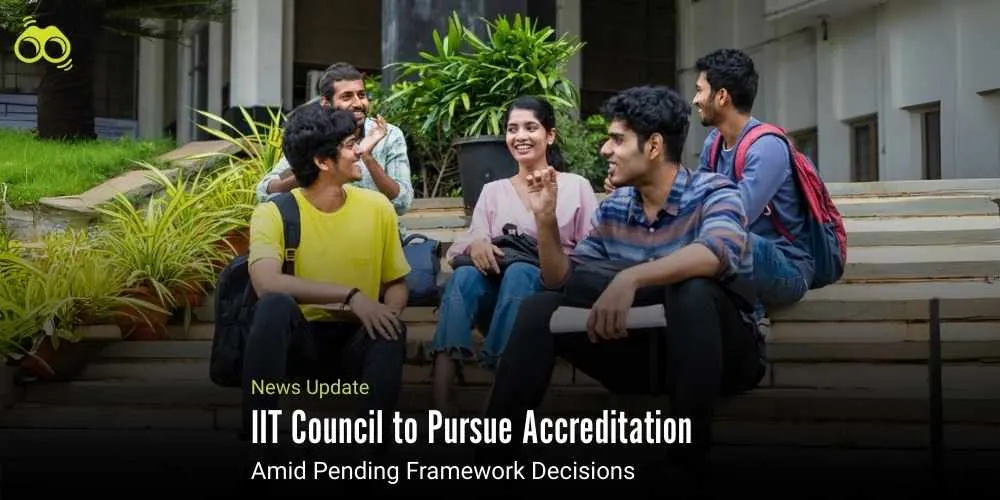NEP 2020 Drives IIT Accreditation Reform; HECI Framework Awaited
IIT Council Endorses Accreditation Framework, Marking Shift in Higher Education Governance
India’s premier engineering institutions are entering a new phase of academic accountability. At a recent meeting of the IIT Council, it was confirmed that all Indian Institutes of Technology (IITs) will now be required to undergo a formal accreditation process. This marks a significant shift in higher education governance. While the decision has been agreed upon, a senior Ministry of Education official clarified that key details, such as the accrediting authority and evaluation criteria,are yet to be finalised. In the interim, IITs are expected to develop and propose a framework tailored to their individual academic models and institutional priorities.
This move is closely aligned with the recommendations of the National Education Policy India (NEP 2020), which proposed the establishment of a National Accreditation Council under the Higher Education Commission of India (HECI). However, with HECI still pending formalisation, the broader mechanism for higher education accreditation remains unresolved. At present, IITs rely on internal peer review systems and are not assessed by the National Assessment and Accreditation Council (NAAC), which oversees accreditation for most Indian universities.
Further momentum for reform came from a 2023 Ministry report on strengthening higher education governance. The committee, chaired by Dr K. Radhakrishnan, advocated for integrating IITs into a unified accreditation system. The proposed framework aims to ensure consistent quality assurance and align India’s engineering education with global benchmarks. Experts have suggested that such reforms could pave the way for international accreditation, such as ABET for engineering programmes, and significantly enhance the global reputation of technical education in India. In addition to accreditation, the Council meeting, reconvened after a two-year gap since April 2023, addressed student welfare and inclusivity. IIT Madras presented a series of initiatives focused on mental well-being, including peer support networks and wellness centres. These efforts reflect a growing recognition of the need to embed mental health into campus life, a trend increasingly adopted by leading global universities.
Language inclusivity also featured prominently in the discussions. Union Education Minister Dharmendra Pradhan urged IITs to incorporate Indian languages into their teaching frameworks to support inclusive growth. While implementation will be determined by each institute’s Senate, IIT Jodhpur has already introduced first-year BTech courses in Hindi. This initiative supports NEP 2020’s vision for multilingual education and aims to make technical learning more accessible to students from diverse linguistic backgrounds.
Although the National Credit Framework (NCrF) was expected to be tabled, it was not formally addressed during the meeting. Nevertheless, the Ministry confirmed that IITs have drafted an accreditation framework and outlined a structure for its rollout. Once implemented, the NCrF is expected to support flexible learning pathways, credit portability, and integration with the Academic Bank of Credit, bringing Indian higher education closer to global standards. Officials concluded that these developments form part of broader reforms in technical education, aimed at strengthening institutional accountability, enhancing academic mobility, and reinforcing the role of the IIT Council in shaping the future of Indian higher education. By moving towards a unified and internationally recognised accreditation system, IITs are positioning themselves to lead not only within India but also on the global stage. This collective shift signals a new chapter for IITs, one that champions excellence, inclusion, and international relevance.
Editor’s Note
India’s technical education system took a major turning point. The decision to formally accredit all Indian Institutes of Technology (IITs) is not just a procedural update; it’s a strategic move towards greater transparency, global recognition, and academic excellence. For decades, IITs have operated outside the national accreditation framework, relying on internal peer reviews. While their reputation remains strong, formal accreditation will help benchmark their performance, ensure consistent quality, and open doors to international collaborations. Accreditation matters because it builds trust. It allows students, employers, and global institutions to understand the standards of education being delivered. By aligning IITs with global accreditation systems like ABET, India can position its engineering graduates more competitively on the world stage. It also encourages continuous improvement, making sure that teaching, research, and student support evolve with changing needs.
This reform is closely tied to the National Education Policy (NEP) 2020, which has been instrumental in reshaping higher education in India. NEP’s push for a National Accreditation Council under the Higher Education Commission of India reflects a broader vision, one that values flexibility, inclusion, and quality assurance. The policy has also encouraged multilingual instruction, mental health support, and credit portability, all of which were discussed at the recent IIT Council meeting. What’s especially promising is the emphasis on student well-being and inclusive learning. Initiatives like offering BTech courses in Hindi and strengthening mental health services show that IITs are beginning to look beyond academics and consider the full student experience.
As per Skoobuzz, as India moves towards a unified and globally recognised accreditation system, this step ensures that its top engineering institutions remain not only nationally respected but internationally relevant. It’s a timely and necessary shift that will benefit students, educators, and the future of innovation in India.














0 Comments (Please Login To Continue)